|
It was several months ago that I first heard
that STI International of Georgetown, Texas was
introducing a replica of the famous Colt Single Action
Army revolver. There are many such replicas on the market, some
better than others, but STI has a reputation for building top
quality high performance competition auto pistols, and I was
anxious to see the new sixgun, which had been dubbed the
"Texican". Production was not started as soon as
anticipated. Most of us had hoped to see the new sixgun at the 2007
SHOT Show in Orlando, Florida back in January, but it
was not yet ready. It was not until early November that I
got the call that the guns were in production, and as of this
writing, I have been playing with the new Texican for a few days
now.
Single action revolvers are a new venture for
STI. While the Single Action Army (SAA) design has been around
since 1873, and is certainly a proven design and is the most
recognized and copied revolver in the world, STI wanted the
Texican to be not just another SAA replica, but they wanted it
to be the best SAA replica ever built. They just might have
succeeded in that goal.
The STI Texican is priced to compete with the
high-end revolvers produced by Colt and US Firearms.
STI built their reputation upon the manufacture
of precision parts for 1911 auto pistols, along with complete
competition guns that push the 1911 design to its limits, with
electron discharge machined (EDM) parts and modular frame
assemblies.
The new Texican revolver uses what STI calls
ultra high speed machining, which is reported to eliminate the
need for polishing. All parts are machined from bar stock or
forgings. All of the internal parts, except for the springs, are
made using the EDM process, which results in small precision
parts that have no grinder or tool marks. The Texican uses
leaf hammer, bolt, and trigger springs, and the hammer spring
has a relief cut to give the hammer a lighter pull, while still
having plenty of power to light off primers reliably.
The first Texicans off the line will all be
chambered for the .45 Colt cartridge and wear five and one-half
inch barrels, with other barrel lengths and chamberings to
follow. The sample Texican weighed in at thirty-seven ounces.
My first impression upon removing the Texican
from its hard plastic case, was that this is a very precise,
tight revolver. While hard to put into words, the overall
impression is that every flat surface is dead flat, and every
radius is perfect. There are no wavy flat surfaces, dished screw
holes, or mismatched metal parts. No machining marks in the
cylinder flutes or bolt notches. There are absolutely no gaps or
protrusions where metal parts meet. The beautiful color case
hardening is done by Doug Turnbull, and the blued parts,
while not polished to a mirror finish, are very even and well
executed.
The checkered hard plastic grips are very well
fitted to the grip frame and trigger guard, and have only very
slight clearance where they meet the cylinder frame. In the
video, I commented that the grips were a bit rougher than what I
prefer. I did not mean to imply that the quality was lacking.
Quite the contrary. They are very well-made grip panels. I meant
that the texture is rougher than I desire. I just prefer a
smooth grip myself, as I like to let the gun ride up in recoil.
However, the heavily checkered grips provide a very solid hold
for Cowboy Action shooters
who rely upon speed of fire to be competitive. Using light loads
as are typical in that sport, the grips work very well. Shooting
full-power hunting ,defense, and working loads, I find that the
grips abrade my hand with my shooting style. Grips are a very
personal thing, and I usually change them on just about all of
my revolvers. On single actions, I prefer a smooth grip of
natural material, and if I end up buying this Texican, will
probably send it off to Eagle Grips for a set of American
elk antler grips.
I mentioned above that the Texican was priced
competitively with the Colt Single Action Army and the upper
tier USFA revolvers. The Texican is built like a first
generation Colt, but to more precise, tighter specifications.
The overall feel is one of quality. The trigger pull on my
sample Texican measured an average of just under two pounds; 1
lb., 15.2 ounces, to be exact. Also, it was extremely consistent
from pull to pull, not varying by more than an ounce either way.
The hammer pulls back smoothly and easily. I usually place a
leather or rubber washer under the hammer spring on a new Colt
or replica. There was no need to do so on the Texican. The
action makes that wonderful "four-click" sound when
the hammer is pulled back, just as God intended. The
cylinder has no detectable lateral nor fore-and-aft play, and by
that I mean none. It doesnít move. I had to force a three
one-thousandths (.003) feeler gauge between the barrel and
cylinder. That is just about perfect. Keep in mind that today,
with some world-famous revolver makers, anything between .004
and .010 is within specs. To me, that is unacceptable. A
tight barrel/cylinder gap increases velocity, and prevents a
revolver from spitting burnt powder back on the shooter and
bystanders. STI got it right on the Texican. Another
subtle but nice feature on the Texican is that the ejector rod
stroke is just a bit longer, by about one-quarter inch, and that
is just enough to assure positive ejection of empty cases.
That can be important during a quick reload. The hammer spur has
a patch of checkering at the top to assure that the thumb
doesnít slip during cocking. The firing pin is mounted on the
hammer, as it should be. This is a traditional style action, and
is best carried with an empty chamber under the hammer.
One thing that I really do not like is to buy a
new revolver, and the sides of the hammer immediately get
scratched by the hammer rubbing on the frame cutout at the rear
of the cylinder frame. On the Texican, it does not rub at all.
Even after a few days of shooting, the sides of the hammer are
unscathed, and the Turnbull case colors are not harmed at all.
The timing on the sample Texican is, in a word, perfect. I
really do not like using that word to describe a function of a
gun, but there is no better word that fits. I checked my
thesaurus. The timing of the bolt dropping into the cylinder
notches is perfect. STI tells me that they use a special type of
free-floating leaf pawl spring that will give a lot longer
service life to competitors who put a lot of miles on their
sixguns. I didnít tear the gun down that far, and will take
their word for it. Seems to me that after building as much
precision into the Texican as they have, that would make sense.
The base pin on this Texican is also a precision fit. I usually
install a Belt Mountain base pin on my single action
revolvers, but there will be no need for one on this Texican. It
is tight. The chamber throats on the Texican would just barely
accept a .452 sized bullet, and as close as I could determine,
they were all exactly the same size.
STI tells me that they use some highly technical
and proprietary process to absolutely assure that each chamber
is properly aligned with the barrel. It is not line-boring, but
they would not disclose the exact process. Doesnít
matter. Whatever process they are using, it works.
I started shooting the Texican as soon as I got
it home. I usually take all of my pictures first, but in this
case, I couldnít wait. Over the course of the last few days, I
have fired the Texican mostly with a load that uses the
excellent Mt. Baldy 270-SAA
bullet, which is a modified Keith-style that weighs about
285 grains lubed, and was designed to fit the cylinder of a
Single Action Army revolver. I usually push this bullet to
around 900 feet per second, and it is a good working load for a
single action revolver. I do not shoot "Cowboy" loads,
which is a misnomer. Real cowboys, lawmen, and ranchers in the
Old West used a load that pushed a nominal 255 grain bullet to
around 1000 feet per second (fps) from a good tight .45 Colt
using balloon-head cases stuffed full of black powder. Todayís
"Cowboy" loads shoot light bullets at slow speeds for
competition use. I donít shoot competition, and have no use
for them myself, preferring full-power .45 Colt loads that,
while are not in the magnum realm of handloads, are perfectly
suited to hunting, social work, or to carry on the hip while
working around cattle. The sights on the Texican are easy to
see, with a generous square notch rear, and a front blade that
measures right at one-tenth of an inch in width. For me, the gun
shot right at point of aim at twenty-five yards offhand with the
load described above. It shot lower with one of my
favorite target and small game loads, which uses the H&G
68 style 200 grain semi-wadcutter bullet that is normally used
in 1911 auto pistols. I still push that bullet to around
900 fps in my revolvers, and it is a very accurate load in many
of my sixguns.
For accuracy testing, I secured the Texican into
my Ransom Rest using the
Colt SAA grip inserts, and proceeded paper punching at
twenty-five yards. I was getting some pretty decent groups,
hovering around two and one-half inches, but then I realized
that I was using my handloads in mixed-brand cases. I donít
sort cases on my working loads, but do on my target loads for
better consistency. It makes a real difference. After sorting
the cases by brand, I was able to cut those groups in half. With
both my handloads and Black Hills factory loads, the
Texican would group five shots into less than one and one-half
inches at twenty-five yards. Thatíll do.
STI set out to build a better Single Action
Army, and they have succeeded. Priced as of this writing at
$1260 US, it ainít cheap, but it is priced competitively with
the other high-end revolvers of its type. For competitive Cowboy
Action shooters, it should hold up well and provide years of
service before needing parts. For the rest of us, it should last
a few lifetimes. Hopefully, the Texican will be a success in the
marketplace. It is as well built as any Single Action Army
replica or original that I have ever handled, and much better
than most. The tightness of its action and precision of
its moving parts reminds me of the Freedom Arms
revolvers. While the Freedom is an entirely different style of
revolver and built for a different purpose, the Texican carries
some of the same qualities in its craftsmanship.
I like the new STI Texican revolver, but I am a
sucker for a good single action. I have a weak spot in my heart
for them. When properly executed, a good Single Action Army
revolver points and handles like no other. I like the originals,
and I like the replicas. I like them all when they are done
right. The Texican is done right. It is precision machined from
quality materials, beautifully finished, and pretty darn
accurate. It is a fine single action sixgun, and I highly
recommend it. There are certainly cheaper single actions on the
market, but you never regret buying the best.
Check out the new Texican revolver online at www.stiguns.com.
Jeff Quinn
  
Got something to say about this article? Want to agree (or
disagree) with it? Click the following link to go to the GUNBlast Feedback Page.
|
Click pictures for a larger version.
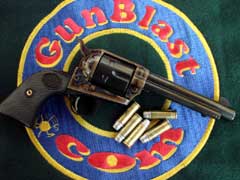
STI's Texican single-action .45 sixgun.
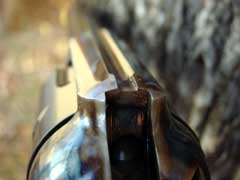
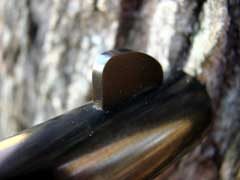
Rear sight (top) and front sight (bottom) are
traditional in design. Close inspection reveals absolute
perfection in the machining and finishing of all surfaces.
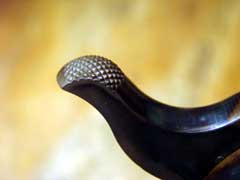
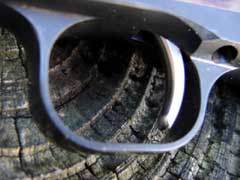
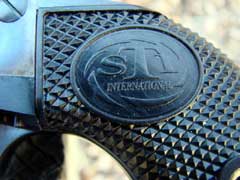
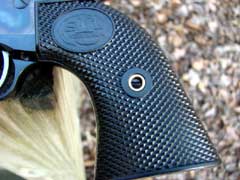
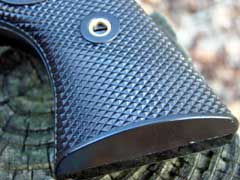
Black plastic grips are checkered for a positive grip,
as preferred by many Cowboy Action shooters.
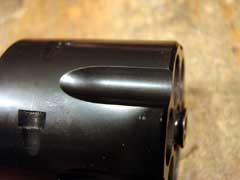
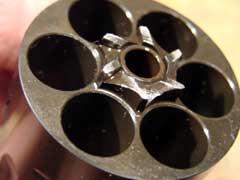
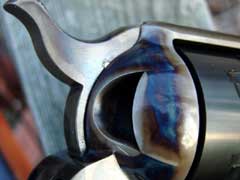
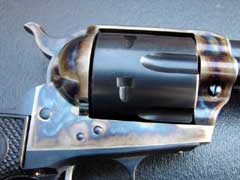
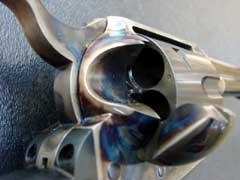
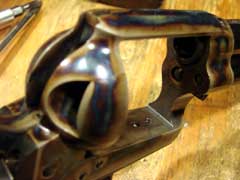
Frame and hammer are beautifully case-hardened by the
modern master, Doug Turnbull.
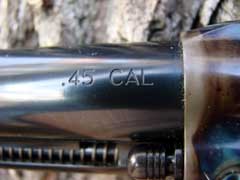
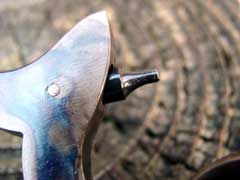
Firing pin is mounted on the hammer where it belongs.
You'll find no safety locks on this sixgun!
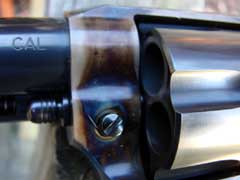
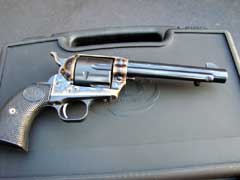
Gun comes with a hard plastic storage case.
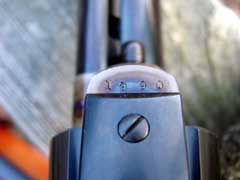
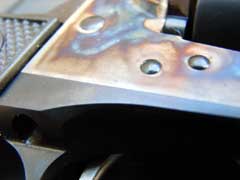
The Texican's superb metal-to-metal fit rivals the
finest custom sixguns.
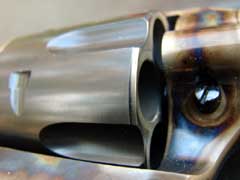
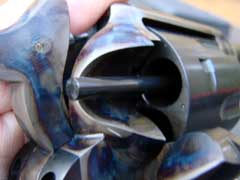
A nice design touch: the ejector rod is slightly longer
for positive case ejection.
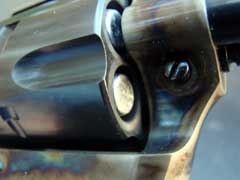
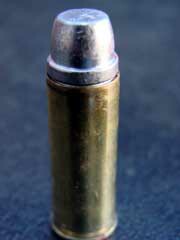
Mt. Baldy's 270-SAA bullet is a perfect fit in the
Texican's cylinder.
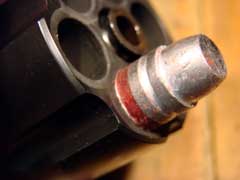
.452" diameter bullets fit tightly into the chamber
throats.
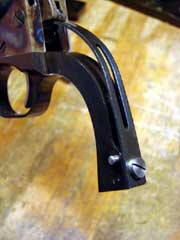
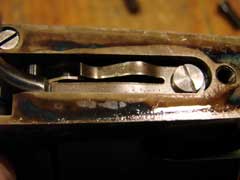
As befits a true Single Action Army, the Texican uses
leaf hammer, bolt & trigger springs.
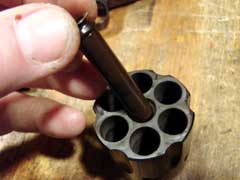
The cylinder has a removable bushing.
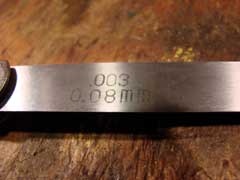
.003" feeler gauge was a tight fit in the
barrel/cylinder gap.
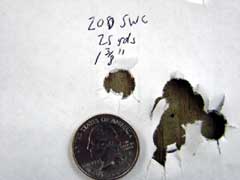
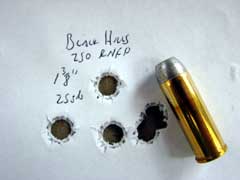
The Texican proved to be an accurate sixgun with a
variety of loads.
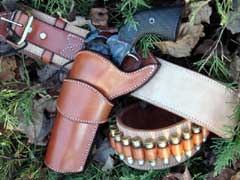
The Texican is right at home in Sixgunner
Leather's
"John Wayne" style rig.
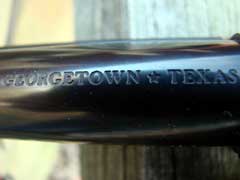
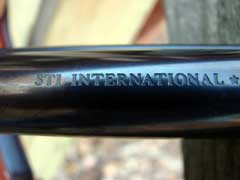
|
![]()